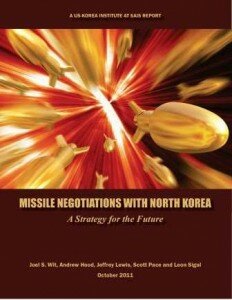 While public attention has been focused on restarting denuclearization talks with North Korea, an important component of any renewed dialogue with Pyongyang will be controlling its ballistic missile program. That effort has been moving gradually but steadily ahead since the North ended its unilateral test moratorium in 2006 with the further development of threatening technologies, as well as the deployment of new models. Secretary of Defense Robert Gates recently highlighted the dangers posed by this effort during his January trip to Asia. He stated, “With the North Koreans’ continuing development of nuclear weapons and their development of intercontinental ballistic missiles, North Korea is becoming a direct threat to the United States, and we have to take that into account.” growing nuclear weapons stockpile and increasingly capable delivery systems will pose a serious danger to the region, and eventually perhaps even to the United States. In short, if the Six Party Talks resume, a high priority for the United States will be to also start negotiations that cover missiles.
While public attention has been focused on restarting denuclearization talks with North Korea, an important component of any renewed dialogue with Pyongyang will be controlling its ballistic missile program. That effort has been moving gradually but steadily ahead since the North ended its unilateral test moratorium in 2006 with the further development of threatening technologies, as well as the deployment of new models. Secretary of Defense Robert Gates recently highlighted the dangers posed by this effort during his January trip to Asia. He stated, “With the North Koreans’ continuing development of nuclear weapons and their development of intercontinental ballistic missiles, North Korea is becoming a direct threat to the United States, and we have to take that into account.” growing nuclear weapons stockpile and increasingly capable delivery systems will pose a serious danger to the region, and eventually perhaps even to the United States. In short, if the Six Party Talks resume, a high priority for the United States will be to also start negotiations that cover missiles.
However, little if any thought has been given both among the governments involved and the expert community, to a strategy for missile talks with North Korea. Devising such a strategy would not require Washington to start from scratch since it held missile negotiations with Pyongyang in the late 1990s that almost led to a breakthrough agreement. While that negotiation could serve as a baseline for future talks, a new strategy would need to take into consideration the fact that over a decade has passed since those discussions ended and the overall political, military and security context has changed.
In this USKI Special Report, authors Joel S. Wit, Andrew Hood, Jeffrey Lewis, Scott Pace and Leon Sigal compile attempt to flesh out a strategy for future missile negotiations that builds on past experiences and addresses the situation on the peninsula.
DOWNLOADS
- “Missile Negotiations with North Korea: A Strategy for the Future,” by Joel S. Wit, Andrew Hood, Jeffrey Lewis, Scott Pace and Leon Sigal. October 2011. (PDF: 50 pps)



